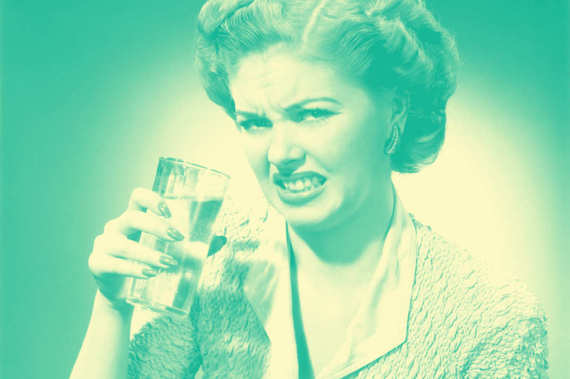By Cari Romm
Hey, what's that word that describes something kind of wet, but isn't damp or dank or clammy? You know, the one that starts with an "m." Come on. Say it. Say it out loud.
Did you? Or are you cringing at the thought? Do you feel a little squirmy now, a little uncomfortable in a way you can't quite name?
Join the club. It's not exactly a secret that the word moist is among the most hated in the English language. In a 2012 post on Language Log, linguist Mark Liberman explained the concept of "word aversion," nailing the feeling so many people get when moist comes up: an "intense, irrational distaste for the sound or sight of a particular word or phrase ... simply because the word itself somehow feels unpleasant or even disgusting." It's different than the irritation you might feel when someone misuses literally, or the disgust some people have for the word bitch. It's less contextual, more visceral. It's a feeling that bubbles up from the gut.
Related: The Universality of the Word 'Huh'
Less clear, though, is why that's the case -- but in a new paper in the journal PLoS One, psychologist Paul Thibodeau offered a theory: The word's connotation with bodily functions triggers our disgust reflex, reminding us of all the gross things our bodies can do.
For the paper -- cruelly titled "A Moist Crevice for Word Aversion" -- Thibodeau asked a group of online volunteers to rate moist and several other terms on a handful of scales, including arousal ("How exciting is the word?"), valence ("How positive or negative is the word?"), and how averse they felt to the word. They were also asked to make their own guesses as to what, exactly, made moist so offensive: Was it the way it sounded, or the meaning?
Overall, the most popular answer was that the sexual connotations of moist were to blame; those who were especially averse to the word were more likely to name the sound as the reason. The data didn't strongly support either reason, though: The people who had the most intense reactions to moist didn't show the same response for words that sounded similar, like hoist or foist, or to sexual words like penis. But Thibodeau did find a link between aversion to moist and a distaste for its synonyms (like damp) and bodily-function words (like phlegm).
There's something about this explanation that feels just a little unsatisfying. Phlegm, after all, isn't nearly as widely maligned. Damp doesn't inspire the same sense of squeamishness in so many people. There has to be something else at play.Related: These Linguists Want to Help You Speak Fluent Cat
And there's a chance that something may be deceptively simple: We've brought this scourge upon ourselves. In a Slate piece on moist in 2013, linguist Jason Riggle argued that aversion to moist may be a meme more than an innate reaction to something inherent to the word itself:
Riggle thinks the phenomenon may be dependent on social interactions and media coverage. "Given that, as far back as the aughts, there were comedians making jokes about hating [moist], people who were maybe prone to have that kind of reaction to one of these words, surely have had it pointed out to them that it's an icky word," he says. "So, to what extent is it really some sort of innate expression that is independently arrived at, and to what extent is it sort of socially transmitted? Disgust is really a very social emotion."
Thibodeau briefly raised a similar idea in his paper, writing that hatred for the word may partly be "a fad" or a "viral phenomenon." And it's possible that the awfulness of moist is some combination of things, with roots in both cultural and biological ideas of disgust. Maybe it was already disgusting because of its link to bodily functions, and then we plucked it out of the pile and ran with it. People may find moist particularly gross, in other words, because of a critical mass of TV shows and articles like this that tell them to. We've collectively made too many moist jokes; now we're all just reaping the moist, sticky mess we've sown. Sorry.More from Science of Us:Why Americans Ignore the Role of Luck in EverythingHow to Make Yourself Forget a Bad MemoryYou Probably Can't Tell When Your Kid Is LyingHalf of Your Friends Probably Don't Think of You As a FriendThe Psychological Cost of Boring Buildings
